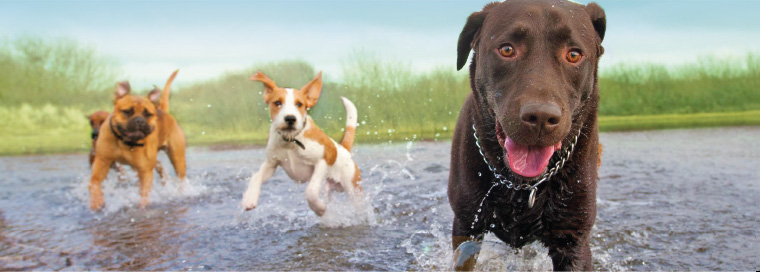
Our pets leap around the house in full-play mode every day. Sometimes it's hard to keep track of all the bumps and scrapes they give themselves - especially if they're playing with other four-legged friends. It doesn't take much to cause a skin infection, and while they're often quick to heal, an unattended infection can cause lasting health issues for your pet.
Dermatitis
Dermatitis is a common problem in pets and in humans. Think of a rash or any sort of skin inflammation and you'll realize you're already familiar with dermatitis. For our feline and canine friends, dermatitis can be caused by several things, including yeast or bacterial infections from playing in the water. The good news is that these infections are totally treatable.
Recognizing Infection
To start with, if you're not 100% sure what you are dealing with, always take your pet in for a vet visit. Unfortunately, our pets can't tell us what hurts or why and mistreating an infection can lead to further health risks for your pet. With that in mind, here are a few things to look for to help spot an infection:
- Acute, chronic or recurring diarrhea
- Soft, light-colored, greasy stool with particularly foul smell
- Stomach ulcers
- Bloody stool
- Kidney problems
- Dehydration and/or weight loss (caused by excessive diarrhea or vomiting)
And that's just to name a few. If your pet is exhibiting any of these symptoms then it's important for you to assess the situation, take your pet to a vet, and begin treatment...

Dealing with Yeast Infections
Do you have a water dog- the kind of buddy that just can't stay out of the mud or the nearest creek? These pets are more prone to yeast infections; but even if you don't let your pets play in the water, they are still at risk if you live in a warm and humid area. The moisture may keep your pets a little too moist, which allows yeast to grow on their skin.
Treating Yeast Infections
Because yeast is a type of fungus, your pet will require an antifungal treatment. Cats and dogs both develop yeast infections in their ears, and while these infections can be easy to spot because of excessive scratching or head shaking, it isn't always as simple as treating a yeast infection. The cause of the infection could be anything from allergies to a ruptured ear drum.
Once you've identified the source of the infection you'll be able to help your furry friend avoid future occurrences. Make sure you thoroughly dry your pet after a bath, a day in the mud or a swim in the lake. If the day is especially humid, consider towel drying the moisture from their fur.

What Are Hot Spots?
Hot spots are more common on dogs than cats, and they're easily identifiable because they are angry red, moist lesions. These painful and itchy patches are caused by bacterial infection and require treatment. Identifying the source of the itchiness often requires a vet's help, too, because allergens are often involved. Anything that makes your pet itch can lead to a hot spot, because once your pet's scratching damages the skin, your pet is at risk for developing the bacterial infection that leads to hot spots.
Treating Hot Spots
The hot spot must be kept clean, and sometimes that requires removing more fur from around the lesion. There are ointments and sprays to help remove the bacteria, but you'll also probably need an Elizabethan collar - sometimes called a cone of shame - to keep your pet from licking the wound open. Steroids are often prescribed by your vet as well, to help minimize the itching and discomfort.

Once the spot is completely healed, your pet's skin and coat might need a little help, so consider using a nutritional supplement to help repair the damage. Supplements can help speed up the healing process. The best part about monitoring your pet's health is that you get to spend time with your pet. While you're brushing your dog you'll notice most of these things. Make it part of your routine. The friendship you share with your pet lasts for your pet's entire lifetime. Remember that treatment isn't the only step to take when your pet is sick - you also have to find the cause of the illness to avoid its recurrence. These basic care tips will help you avoid any further bouts of infection.
Article by: Anum Yoon
Anum Yoon is the blogger and founder of Current On Currency. When she's not busy typing away on her computer, she spends time with her two furry best friends.
